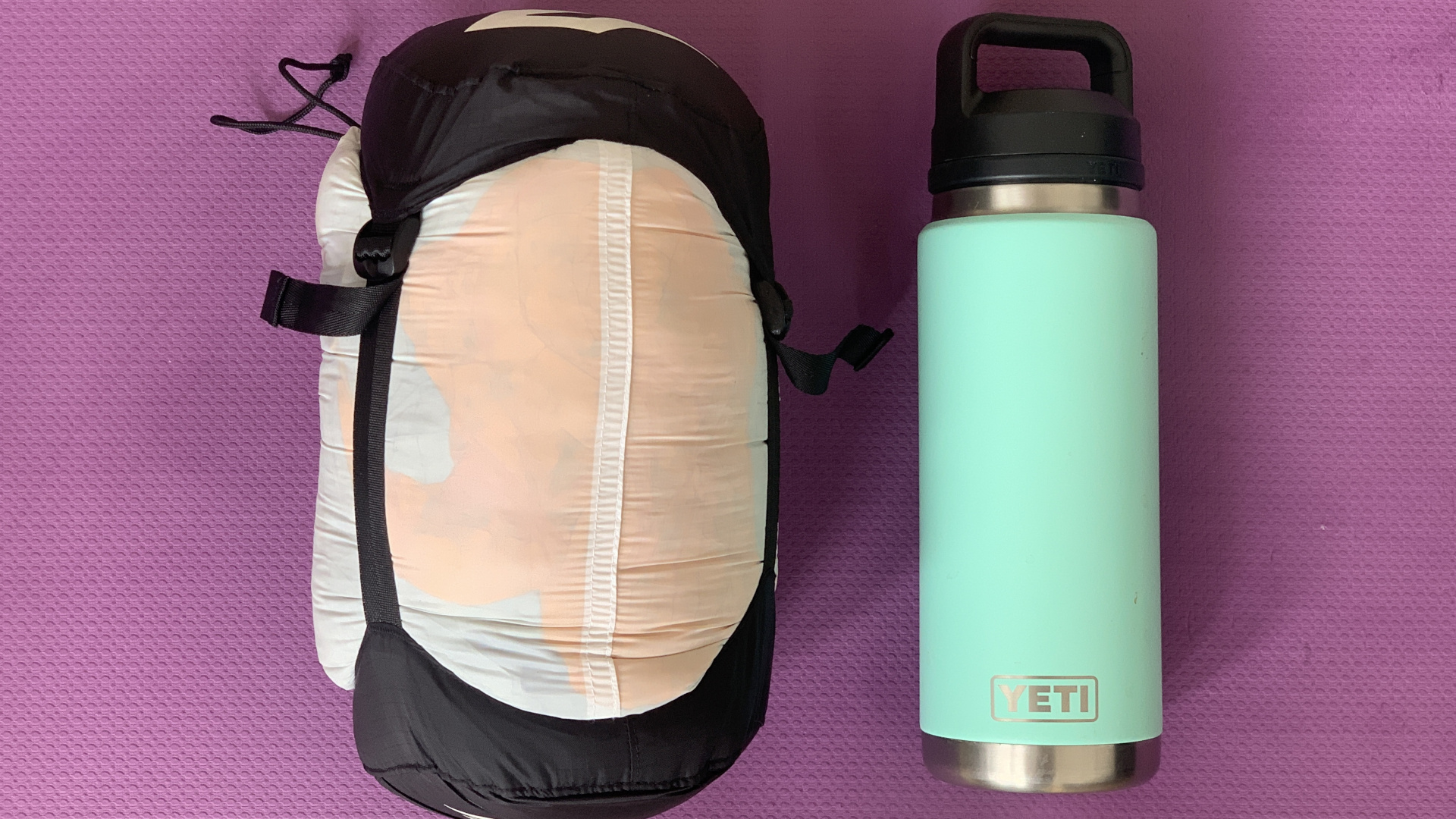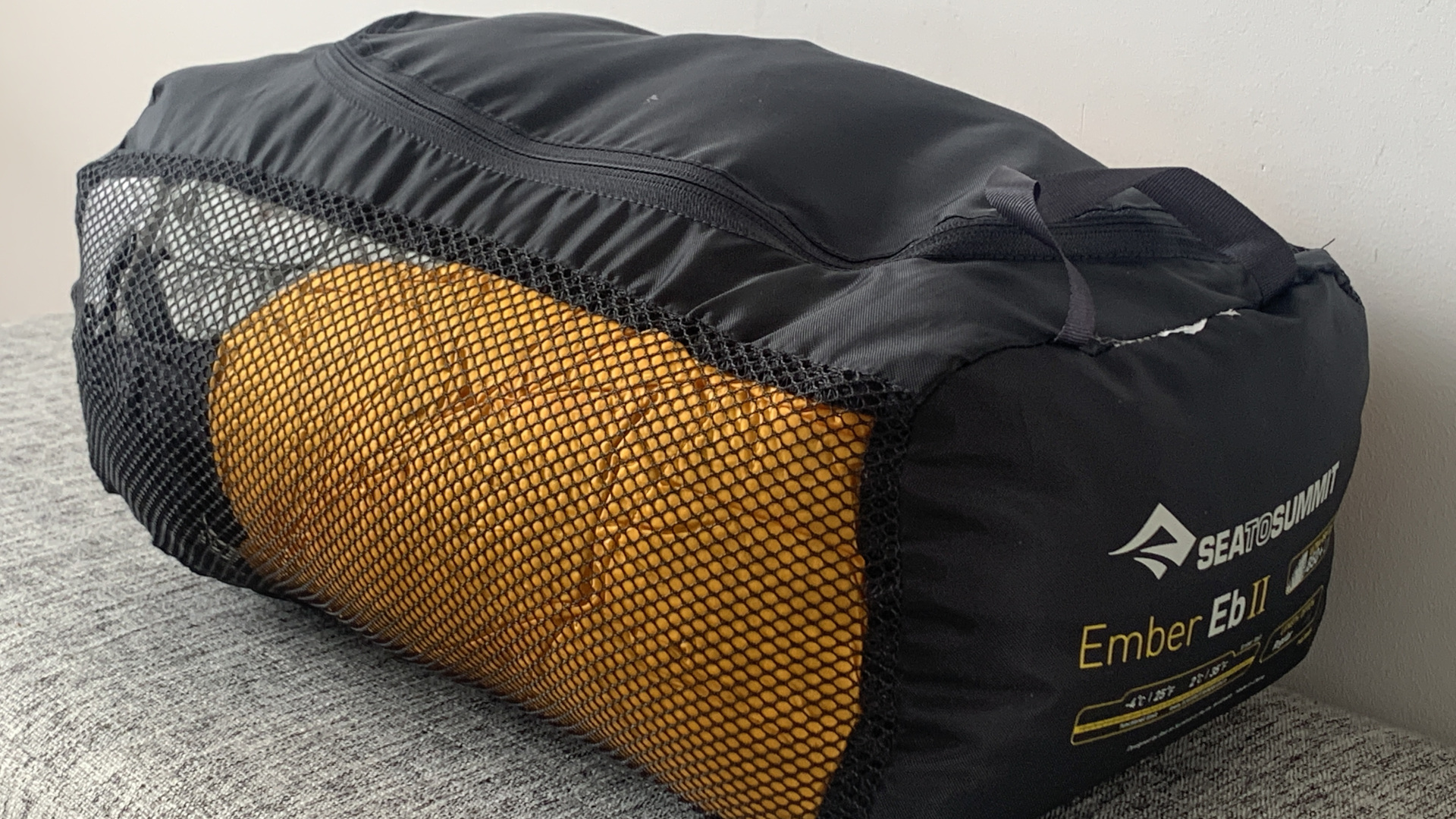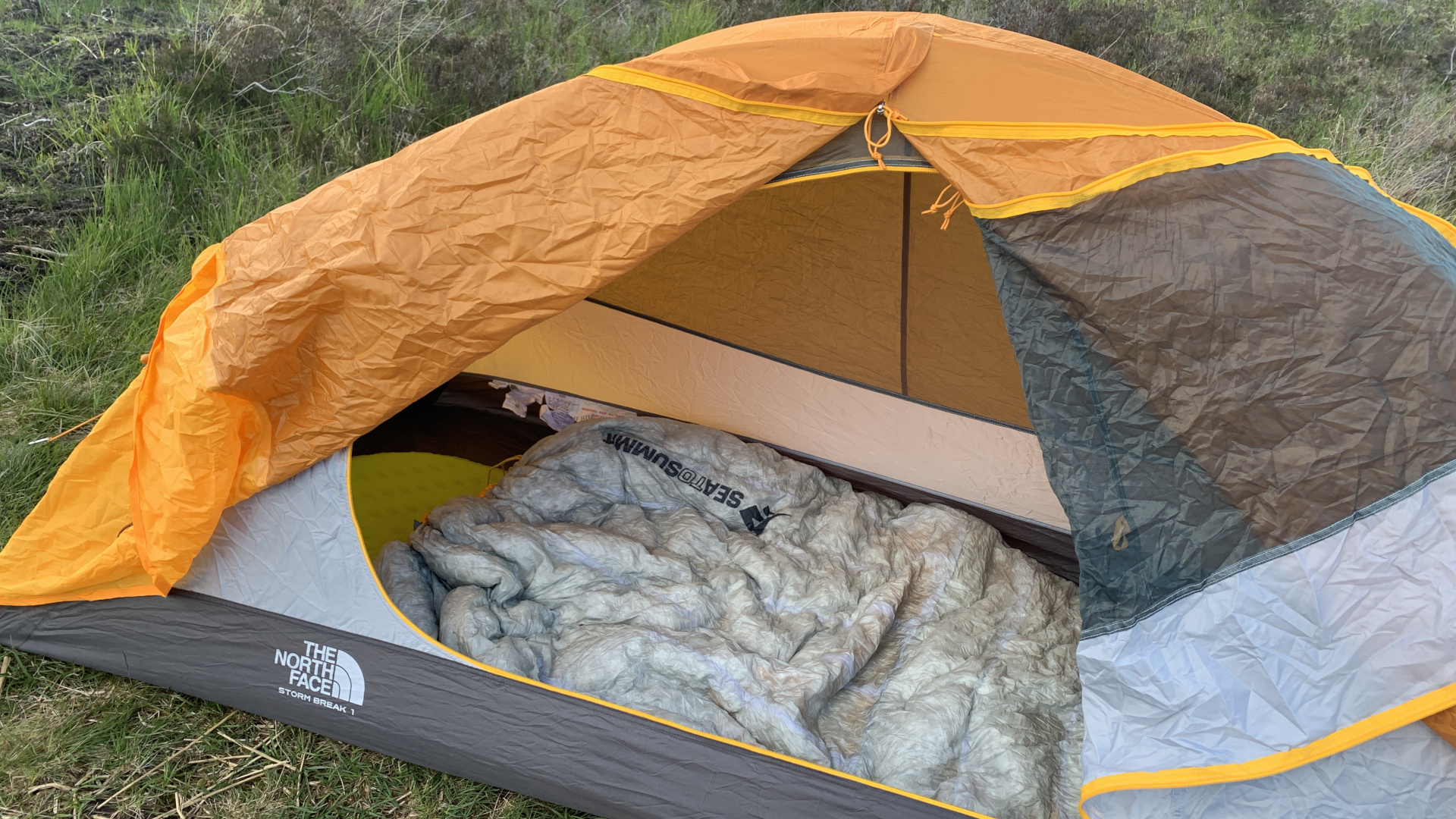Advnture Verdict
This lightweight, versatile backpacking quilt relies on a drawstring rather than a footbox, so starfish sleepers can sprawl out and still stay warm from late spring to early fall
Pros
- +
Lightweight and packable
- +
Sleep comfortably in any position
- +
Easy to use snap straps seal out drafts
- +
Water resistant stuff and quick drying
- +
Comes in three sizes and three temperature ratings
Cons
- -
A little pricey compared to some competitors
- -
Fabric is slightly rustly
- -
A little heavier and bulkier than some competitors
You can trust Advnture
Sea to Summit Ember II Down 35° Sleeping Quilt: first impressions
If you’ve been looking for a lightweight and packable alternative to your best sleeping bag for backpacking trips this summer, you’ll find lots to love about this camping quilt that lets you sprawl out at camp but keeps the drafts at bay on cool nights.
The Sea to Summit Ember II Down 35 Sleeping Quilt boasts 850+ fill power down to keep you warm on cool nights. It's zip-free, and uses four adjustable snap straps to easily attach to your sleeping pad to seal out drafts when the weather cools off. Rather than a footbox, which many camping quilts feature, it uses a drawstring system to tighten around your feet when it’s chilly which leaves you much more freedom to sleep in any position, and lets you easily kick a leg out when it’s too warm. A draw cord around the shoulders also helps you keep your neck warm without breathing into a hood all night.
• List price: £325 - £350 / $369 - $389
• Sizes available: Regular (for sleepers up to 6’), Long (up to 6’4”)
• Unisex: Yes
• Materials: Shell: Ultralight 10D Nylon Shell; Fill: Ultra-Dry Down™ 850+ Loft
• Weight: Regular: 1 lb 5.2oz / 600g; Long: 1lb 8oz / 680kg
• Fill weight: Regular: 12.3oz / 350g; Long: 14.1oz / 400g
• Comfort rating: 35F / 2C
• Limit rating: 25F / -4C
• Colors: Gray/yellow
• Best use: Backpacking, thru-hiking
Made with a DWR coating and quick-drying down, and including a water-resistant stuff sack, this quilt holds up well against damp conditions and accidental spills. Though the 35° is really best suited for mild to cool weather camping, this quilt comes in a 25° and 50° option, and it also comes in three sizes for extra versatility: regular, long and double.
We’ve tested out camping quilts that are even lighter and more packable than this one, but no lightweight backpacker is really going to complain about the weight and size of this one.
The Sea to Summit Ember II Down 35 Sleeping Quilt boasts 850+ fill power down to keep you warm on cool nights. It is zip-free and uses four adjustable snap straps to easily attach to your best sleeping pad to seal out drafts when the weather cools off. Rather than a footbox, which many camping quilts feature, it uses a drawstring system to tighten around your feet when it’s chilly, which leaves you much more freedom to sleep in any position, and lets you easily kick a leg out when it’s too warm. A draw cord around the shoulders also helps you keep your neck warm without breathing into a hood all night.
Sea to Summit Ember II Down 35° Sleeping Quilt: in the field

I took this quilt out for a few nights of wild camping as I hiked the West Highland Way, and was well impressed by its comfort and performance as a lightweight alternative to my sleeping bag.
If you don’t know already, a camping quilt is like half a sleeping bag, with no zip, so it's lighter and more packable than the traditional bag. Most of them feature a footbox that wraps around the bottom since you lose a lot of heat through your feet, but this one replaces that with a drawstring and I found that kept my tootsies warm on one of the cooler nights, but allowed me the freedom to sleep in any position. That’s a huge bonus for me as I like to rotate through starfish, right side, belly and left side at regular intervals. It also meant I could just fling a leg out to cool off once the sun started warming my tent in the morning.
All the latest inspiration, tips and guides to help you plan your next Advnture!
The 35° rating performs as advertised – though I was camping in early June, we haven’t been having a particularly warm year in Scotland and I was comfortable every night. One night when I was up at higher elevation and the skies were really clear, I kept my best hiking socks on, but honestly I often do that in my sleeping bag too. The quilt has four adjustable snap straps to attach it to your sleeping pad, and I found these sealed out the drafts without restricting my movements. They are really easy to use; I basically kept the lower three fastened and then was able to just slide my pad into them, which was pretty impressive since I was doing all this in my tiny one-person tent. Once I was in bed, I could actually just slide the fourth strap underneath me to fasten it, which I thought was a huge perk. Though I never needed to use it, it also has a drawstring cord around your neck for chillier nights. This does make it a little difficult at first to tell head from toe, but you soon figure it out.

As you may know, down doesn’t insulate when wet, and even though I had uncharacteristically fantastic weather, I did have one accidental water spill. Fortunately, this has a DWR coating and is made using fast-drying down which worked a charm.
It comes with a water resistant stuff sack which was handy when I absentmindedly chucked into the dewy grass while I was packing up each morning. This let me pack it down to about 6 x 10”, though I noticed the specs say it should pack down to 6 x 7” but perhaps I need to use more brute strength. Speaking of bags, I also liked the compact, zip up mesh storage bag it comes in, which keeps it much tidier at home than the usual pillow case with a drawstring vibe, if you know what I mean.
I have another camping quilt that is definitely a bit lighter and more packable than this one, and has softer fabric – this one is ever so slightly rustly – but given the overall performance and comfort of this one, I’d take this on my next adventure and the one after that, too.
Here’s how it performed:
Comfort
Comfort comes from the design, which allows you to sleep in any position, and the fabric is soft enough, if ever so slightly rustly.
Warmth
12 ounces of 850+ fill power definitely power you through a cool night, and the four straps and neck and foot drawstrings help you seal out drafts. A warmer version is available for cold sleepers and colder nights.
Ease of use
Snap straps are so easy to adjust, even once you’re lying down, and you can slide your pad inside this even in the smallest of tents.
Weather resistance
The DWR treatment on the shell works really well, plus the down is quick drying. A water resistant stuff sack helps protect it from wet tents inside your backpack too.
Durability
Because there’s no zipper to break, there’s not a ton that can go wrong with this quilt unless you’re packing it next to lots of sharp objects in your bag. The nylon shell is sturdier than some super soft competitor quilts and it is down-proof so you don’t shed feathers.
Julia Clarke is a staff writer for Advnture.com and the author of the book Restorative Yoga for Beginners. She loves to explore mountains on foot, bike, skis and belay and then recover on the the yoga mat. Julia graduated with a degree in journalism in 2004 and spent eight years working as a radio presenter in Kansas City, Vermont, Boston and New York City before discovering the joys of the Rocky Mountains. She then detoured west to Colorado and enjoyed 11 years teaching yoga in Vail before returning to her hometown of Glasgow, Scotland in 2020 to focus on family and writing.


